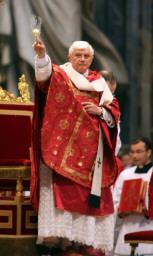Pope Benedict XVI provoked a political flurry on Monday, when he attacked Italy's abortion laws, saying they had damaged society.
Addressing an assembly of the pro-life group Movimento per la Vita, the head of the Catholic Church suggested the 1978 law legalizing abortion had created societal difficulties and diminished the value of life in general.
''Allowing pregnancies to be interrupted has not only failed to resolve the difficulties facing many women and some families, it has inflicted a fresh wound on our society, which is already burdened down with suffering,'' said the pontiff.
''It is impossible to ignore the fact that human life has become effectively harder to protect over the last three decades. There is now a mentality that progressively devalues the worth of human life''.
The pope also echoed comments made by Italian President Giorgio Napolitano on Sunday, in which he urged parliament to provide greater economic and social support to would-be parents.
Benedict suggested there were many reasons women decided to terminate pregnancies, some of which could be tackled by parliament.
''The lack of a safe job, legislation that often fails to protect maternity and the impossibility of ensuring adequate support for children are just some of the obstacles that can suffocate a fertile love, while resulting in growing sense of mistrust in the future,'' he said.
The Italian abortion law, which came into effect on May 22, 1978, was approved after a referendum and in the face of fierce opposition from the Catholic-dominated establishment.
It allows abortions until the 90th day of pregnancy. After this point, terminations may be carried out only if the mother's health is at risk or the foetus is deformed.
The pope's remarks provoked an immediate response from politicians of all stripes, with some expressing support for his stance and others angry at his perceived interference in Italian politics.
The Deputy Speaker of the House, Maurizio Lupi of the centre-right governing People of Freedom (PDL) party, said the political world should make certain ''Benedict XVI's appeal does not fall on deaf ears''.
Another PDL figure, Isabella Bertolini, expressed ''complete agreement'' with the pope, saying the 1978 law had ''caused human and societal wounds difficult to ignore''. She suggested action was also needed at an international level to ''protect this massacre of innocents''.
Luca Volonte, an MP with the small, Catholic centrist UDC party, said: ''Life and family have an innate sanctity. The pope has done well to issue an appeal for their defence''.
But former health minister Livia Turco defended the country's abortion law, insisting it had reduced the number of terminations.
''The pope's concerns are simply not borne out by the facts,'' she said.
Democratic Party Senate whip Anna Finocchiaro, said she backed better conditions for would-be parents but said the 1978 law had helped put an end to backstreet abortions.
''We do not need ideological wars, [...] the abortion law is balanced and should be supported in its full application,'' she said.
The leader of the Radical party, Marco Pannella, said simply that pope's comments were ''an offence to the Italian democratic state''.
The issue of abortion has been back in the spotlight in recent months, amid repeated attacks from the Catholic Church and pro-life groups.
A large number of politicians, particularly on the centre right, have also been calling for more restrictive legislation.
In February, a prominent newspaper editor, Giuliano Ferrara, created a movement called Abortion? No Thanks.
Ferrara, who campaigned unsuccessfully on a one-issue pro-life ticket in the April elections, is close to Silvio Berlusconi although the new premier has not endorsed all his views.
Last year, Ferrara called for a universal moratorium on abortions, winning the immediate backing of top Catholic Church officials.
Italian Catholics often complain that women are allowed abortions too easily and that thorough consultations envisaged by the 1978 law are little more than a formality.
Another frequent accusation is that doctors change their diagnosis in order to certify healthy foetuses as damaged, allowing for later abortions.
Meanwhile, pro-choice activists have complained that a growing number of pro-life medical practitioners is making it tougher for women to obtain abortions.
Under Italian law, doctors can refuse to perform an abortion if it runs counter to their principles.
Recent health ministry figures suggest that 70% of all Italian gynaecologists are now 'conscientious objectors' compared to 58.7% in 2003 while 50.4% of anaesthetists are opposed to abortion, compared to 45.7% in 2003.









